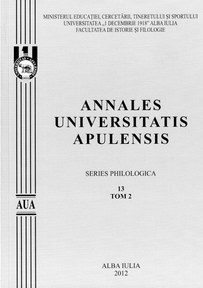Paradoxul narcisismului postmodern în poezia lui Mircea Cărtărescu
The Paradox of Postmodern Narcissism in Mirces Cartarescu’s Poetry
Author(s): Petru Bogdan RaţiuSubject(s): Literary Texts
Published by: Universitatea »1 Decembrie 1918« Alba Iulia
Keywords: the paradox of narcissism; postmodernism; double; “the Other”; reflectiveness; speech
Summary/Abstract: Starting from the assumption that Mircea Cărtărescu’s poetic text develops itself within the horizon of the poetics of the double, of the communication forms which ”reflect” themselves, we may consider as appropriate our choice in realising a study which contains the certainty of narcissism (self-admiration) in the postmodern period, later applying this concept within a wave-like poetic space with consecutive dualities. From the large bibliography of the narcissism concept, we intend to use recent studies, like the one belonging to Jean-Christophe Torres – Du narcissisme: Individualisme et amour de soi a l’ere postmoderne (2011) - according to which we may reach an optimal perspective in the analysis of a poetics setting up a different code through reverie, with the domination of the animated and controversed reality. We consider that the whole Cărtărescu-badged text is visualy defined by a symbolic and intellectual essence through the duplex of experience in reveries and reflections. In this way, the configuration space for the double and the narcissism produce diastoles and systoles, because they increase and decrease due to the capability of the self to bear the synthesis with The Other. The mirror reflects visions, re-produces worlds, being detached from the referentiality and reflecting the self in a similitude of the narcissistic discourse. We will try to notice that at the level of the imaginary the whole reflective process, the reflection into the other is an act born from the structure of a bricolaje. The epic and the continuous fragmentation of the discourse create emblematic products which come from the deep layers of the subconscious. The analysis may be deepened because even the ”under skin” symbolic space reflects itself, causing the identification of the double, as it is shown in the poem “Gloaming” – in the mirror I have seen my face. The reflectiveness is realised down into its depths, until the hidden areas of the body imagined as analogies of the bestiary. But the eye becomes the guide for the view and for The Other, by reflecting the illumination into the sight, a new way of seeing things. The narcissism becomes permanent at an anthropic and cosmic level, being in a direct relation with the scission of the inner self. In both cases, the sight tries to recognize the other, so that in the stage of the mirror (J. Lacan), the inner self be able to identify and unify itself.
Journal: Annales Universitatis Apulensis. Series Philologica
- Issue Year: 13/2012
- Issue No: 3
- Page Range: 215-224
- Page Count: 10
- Language: Romanian

